Co-operative Education Portfolio 1 - BBus701
Developing expertise and application of knowledge in a business context
22 Pages7083 Words408 Views
Added on 2023-06-14
About This Document
This portfolio is designed to ensure that you are achieving the goals and objectives you planned for your Cooperative Education Placement. It includes reflection on feedback from your Learning Plan, demonstration of application of knowledge from your major(s) to your Co-operative Education Placement, and reflection on progress and development in professional skills.
Co-operative Education Portfolio 1 - BBus701
Developing expertise and application of knowledge in a business context
Added on 2023-06-14
ShareRelated Documents
BACHELOR OF BUSINESS
BUSS701
CO-OPERATIVE EDUCATION
Intake 1
Semester One, 2018
PORTFOLIO 1
Developing expertise and application of knowledge in a business context
Student Name: Ada Huang Student ID: 14857289
Major: Management and HR
management
Your contact no: 02102682145
Workshop Supervisor: Rodger
Chesterfield
Academic Supervisor: George
Thien
CP Organisation :Tank Test
Laboratories
CP Supervisor: Eric Wang
BUSS701
CO-OPERATIVE EDUCATION
Intake 1
Semester One, 2018
PORTFOLIO 1
Developing expertise and application of knowledge in a business context
Student Name: Ada Huang Student ID: 14857289
Major: Management and HR
management
Your contact no: 02102682145
Workshop Supervisor: Rodger
Chesterfield
Academic Supervisor: George
Thien
CP Organisation :Tank Test
Laboratories
CP Supervisor: Eric Wang
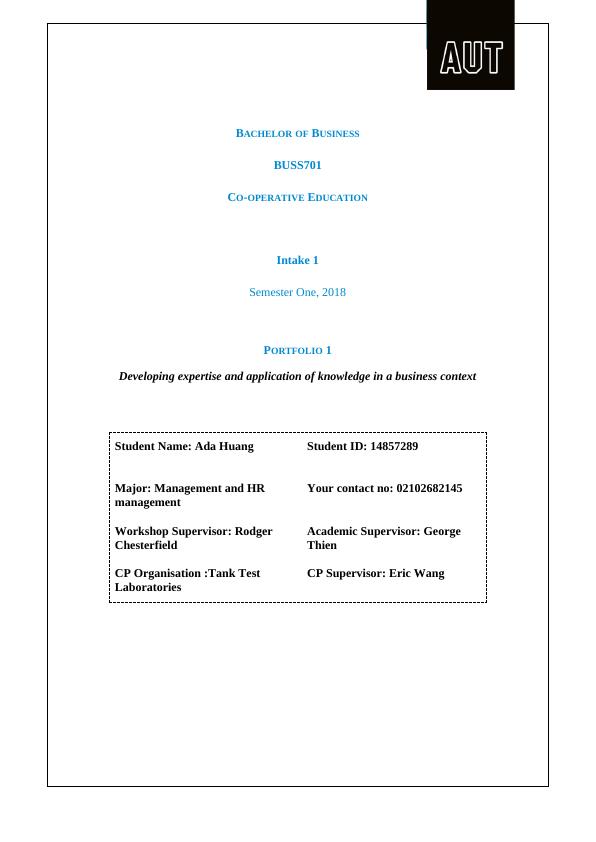
Overview
The Portfolio is part of the academic programme of work you are required to complete for Co-operative
Education.
It is designed to ensure that you are achieving the goals and objectives you planned for your Co-
operative Education Placement.
Please note that throughout your Portfolio you must:
Apply concepts, models, frameworks, theories and/or technical competencies from your major, and
other areas of study
Use authoritative sources
Provide in-text references in APA (6th Ed.)
Update your Reference List with the full reference (APA 6th Ed.)
Throughout Co-operative Education you will be focusing on how you are achieving the BBus Learning
Goals set out below:
Learning Goal 1: Be self-directed, reflective learners
Learning Goal 2: Be knowledgeable in their major field(s) of study
Learning Goal 3: Be critical enquirers and creative problem solvers
Learning Goal 4: Be able to make business decisions that take into account social, ethical,
environmental and global dimensions
Learning Goal 5: Be able to work effectively with others
Learning Goal 6: Be effective communicators
Learning Goal 7: Be connected to business
The Portfolios are the next stage of the assessment programme that culminates in an Oral Brief and
Final Report. In the Co-operative Education assessments you will critically reflect on, analyse and
evaluate your development throughout the Co-operative Education Placement and work on and
complete a topic of your choice.
Instructions for completing this document
You are required to address all of the points in each of the sections. You may either answer each
point individually or you may choose to respond to all points in one discussion using paragraphs
with appropriate headings and sub-headings.
Note: Do not delete any of the information or instructions from the template
Portfolio 1 Checklist
Completed each section.
APA referencing and in-text citations.
Tasks discussed relate to major.
Research topic finalised and is focused towards the use of authoritative secondary
resources.
Student Name & ID: __________________________________ Co-operative Education Portfolio 1 – Intake 1, Semester One,
2018
2
The Portfolio is part of the academic programme of work you are required to complete for Co-operative
Education.
It is designed to ensure that you are achieving the goals and objectives you planned for your Co-
operative Education Placement.
Please note that throughout your Portfolio you must:
Apply concepts, models, frameworks, theories and/or technical competencies from your major, and
other areas of study
Use authoritative sources
Provide in-text references in APA (6th Ed.)
Update your Reference List with the full reference (APA 6th Ed.)
Throughout Co-operative Education you will be focusing on how you are achieving the BBus Learning
Goals set out below:
Learning Goal 1: Be self-directed, reflective learners
Learning Goal 2: Be knowledgeable in their major field(s) of study
Learning Goal 3: Be critical enquirers and creative problem solvers
Learning Goal 4: Be able to make business decisions that take into account social, ethical,
environmental and global dimensions
Learning Goal 5: Be able to work effectively with others
Learning Goal 6: Be effective communicators
Learning Goal 7: Be connected to business
The Portfolios are the next stage of the assessment programme that culminates in an Oral Brief and
Final Report. In the Co-operative Education assessments you will critically reflect on, analyse and
evaluate your development throughout the Co-operative Education Placement and work on and
complete a topic of your choice.
Instructions for completing this document
You are required to address all of the points in each of the sections. You may either answer each
point individually or you may choose to respond to all points in one discussion using paragraphs
with appropriate headings and sub-headings.
Note: Do not delete any of the information or instructions from the template
Portfolio 1 Checklist
Completed each section.
APA referencing and in-text citations.
Tasks discussed relate to major.
Research topic finalised and is focused towards the use of authoritative secondary
resources.
Student Name & ID: __________________________________ Co-operative Education Portfolio 1 – Intake 1, Semester One,
2018
2
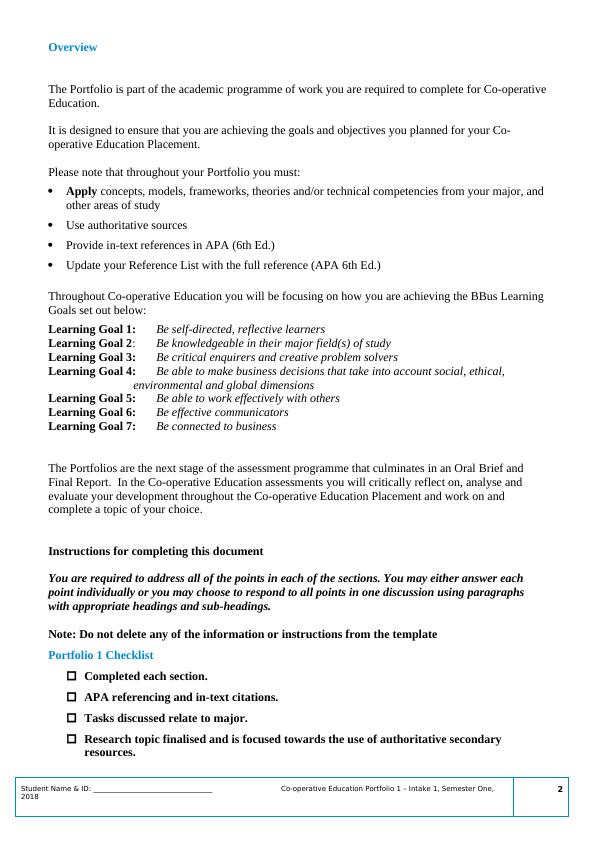
Theories, concepts, frameworks introduced throughout.
Two personal goals reviewed and progress discussed.
Media log completed
Evidence of workspace provided.
Spellchecked and proof read document.
Preparation for your Portfolio 1
Writing up Portfolio 1
Please ensure that you read “Writing up Portfolio 1” document that is available on Blackboard
under the ASSESSMENTS folder /Portfolio 1. This will assist you in completing this assessment.
The aim of this Section is:
To prepare you to complete Portfolio 1.
Reflection on feedback from your Learning Plan
THE TASK:
Reflect on and respond to the feedback you received in your Learning Plan. Include a
discussion of how this has impacted on your approach to this portfolio and/or your
understanding of your ongoing personal and professional development. (2-3 paragraphs).
The feedback received from my Learning Plan has provided me with a number of guidelines of
approaching this portfolio. One of the areas of my understanding stems from the need to manage and
direct my own learning. While responding to this portfolio, I have learnt on how to use different key
words to research and identify appropriate peer reviewed resources, and media resources. Most
specifically, I can now direct myself as well as reflect on my learning approaches through theories and
frameworks. In addition, I can now articulate my goals by creating a link between my learning
experiences and goals. Furthermore, I am able to identify some of my future learning processes such as
researching through secondary data.
Second, the feedback has made me understand how to apply appropriately my knowledge to
different tasks and topics. For example, the knowledge from my major involves applying theories from
management to my role as an office administrator. Currently, I can now conduct an insightful thinking
about my personal attributes and some of the values that I need to add to me. For instance, some of the
topical ideas that relate to my role include time management and cross-cultural communication.
The feedback on my Learning Plan has also made me gain a deeper understanding about my
ongoing personal and professional development. Working as an office administrator involves
interacting with diverse groups of employees from different cultural background. One of the areas of
my future development would require understanding some of the challenges that managers experience
when managing diversified work environment. The second understanding would focus on
understanding the best approaches to use while responding to conflicts arising out of diversified teams.
Student Name & ID: __________________________________ Co-operative Education Portfolio 1 – Intake 1, Semester One,
2018
3
Two personal goals reviewed and progress discussed.
Media log completed
Evidence of workspace provided.
Spellchecked and proof read document.
Preparation for your Portfolio 1
Writing up Portfolio 1
Please ensure that you read “Writing up Portfolio 1” document that is available on Blackboard
under the ASSESSMENTS folder /Portfolio 1. This will assist you in completing this assessment.
The aim of this Section is:
To prepare you to complete Portfolio 1.
Reflection on feedback from your Learning Plan
THE TASK:
Reflect on and respond to the feedback you received in your Learning Plan. Include a
discussion of how this has impacted on your approach to this portfolio and/or your
understanding of your ongoing personal and professional development. (2-3 paragraphs).
The feedback received from my Learning Plan has provided me with a number of guidelines of
approaching this portfolio. One of the areas of my understanding stems from the need to manage and
direct my own learning. While responding to this portfolio, I have learnt on how to use different key
words to research and identify appropriate peer reviewed resources, and media resources. Most
specifically, I can now direct myself as well as reflect on my learning approaches through theories and
frameworks. In addition, I can now articulate my goals by creating a link between my learning
experiences and goals. Furthermore, I am able to identify some of my future learning processes such as
researching through secondary data.
Second, the feedback has made me understand how to apply appropriately my knowledge to
different tasks and topics. For example, the knowledge from my major involves applying theories from
management to my role as an office administrator. Currently, I can now conduct an insightful thinking
about my personal attributes and some of the values that I need to add to me. For instance, some of the
topical ideas that relate to my role include time management and cross-cultural communication.
The feedback on my Learning Plan has also made me gain a deeper understanding about my
ongoing personal and professional development. Working as an office administrator involves
interacting with diverse groups of employees from different cultural background. One of the areas of
my future development would require understanding some of the challenges that managers experience
when managing diversified work environment. The second understanding would focus on
understanding the best approaches to use while responding to conflicts arising out of diversified teams.
Student Name & ID: __________________________________ Co-operative Education Portfolio 1 – Intake 1, Semester One,
2018
3
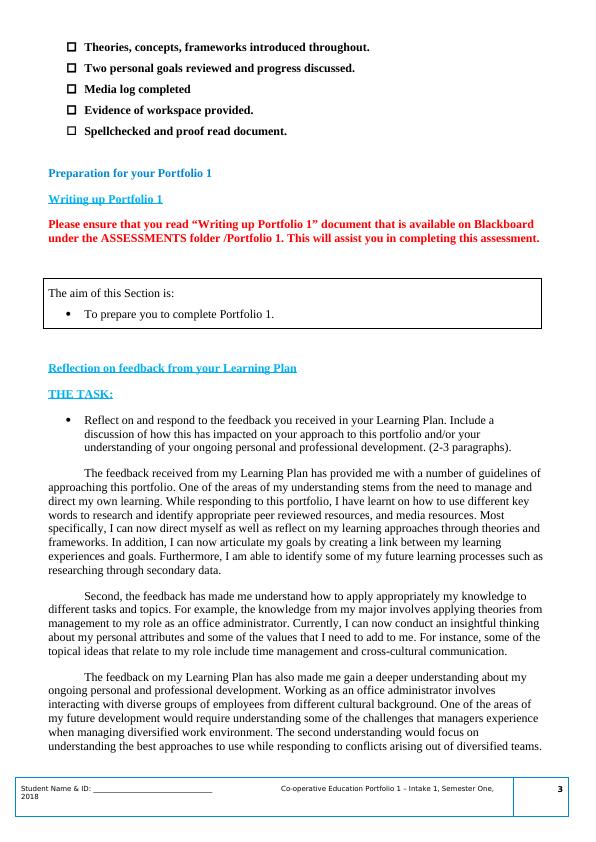
Student Name & ID: __________________________________ Co-operative Education Portfolio 1 – Intake 1, Semester One,
2018
4
2018
4
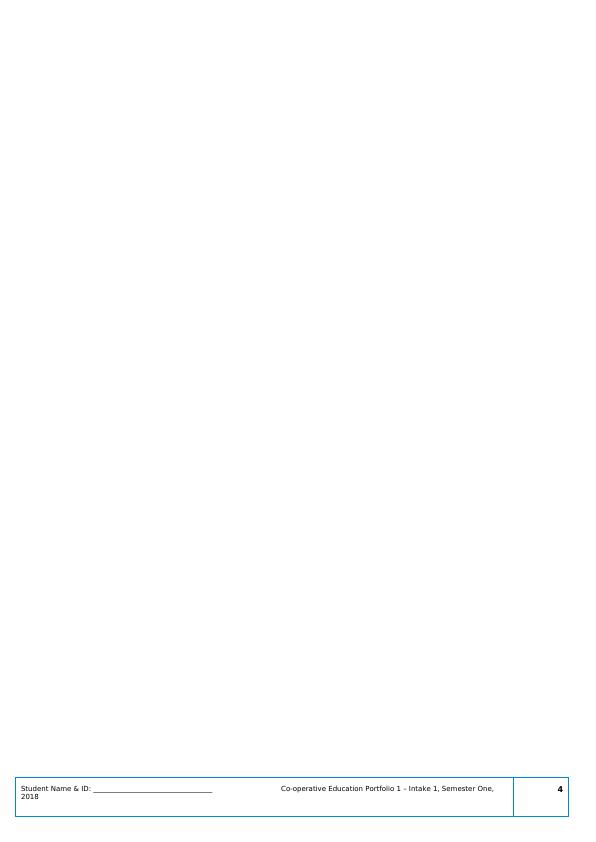
A. Your Co-operative Education Role: being knowledgeable in your major field(s) of study by
demonstrating the application of knowledge from your major(s) to your Co-operative
Education Placement
The aim of Section A is as follows:
To demonstrate how relevant the various theories and concepts from your major have been in
completion of your tasks to date
To reflect on your performance to date
THE TASK:
1. For each key task that you have undertaken so far, briefly describe the task, what your involvement
has been and explain how theories, concepts, models, frameworks and/or technical competencies,
from your major(s) have applied. In your discussion you should:
Student Name & ID: __________________________________ Co-operative Education Portfolio 1 – Intake 1, Semester One,
2018
5
demonstrating the application of knowledge from your major(s) to your Co-operative
Education Placement
The aim of Section A is as follows:
To demonstrate how relevant the various theories and concepts from your major have been in
completion of your tasks to date
To reflect on your performance to date
THE TASK:
1. For each key task that you have undertaken so far, briefly describe the task, what your involvement
has been and explain how theories, concepts, models, frameworks and/or technical competencies,
from your major(s) have applied. In your discussion you should:
Student Name & ID: __________________________________ Co-operative Education Portfolio 1 – Intake 1, Semester One,
2018
5
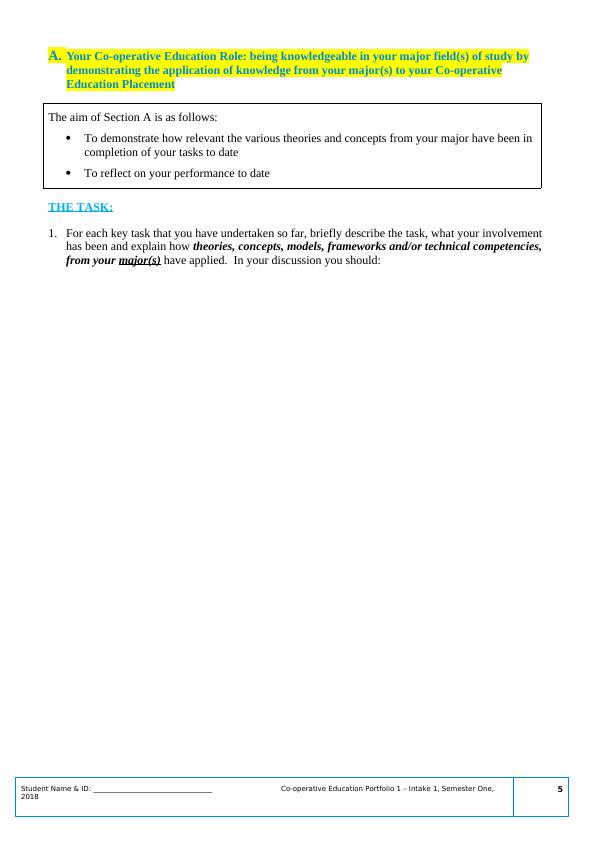
Outline a comprehensive range of theory, concepts, models, frameworks and/or technical
competencies. (Note: You must draw on authoritative sources using in-text reference).
There were a number of theories and frameworks that I covered in my majors. For example, one
of the theories involves the management theory of Fayal’s six functions of management. In his model
for instance, Henri Fayol found that management in organisations serve the roles of planning,
organizing, commanding, coordinating, and coaching. Besides, he managed to add another sixth
component of managerial. Similar to the work of Kummerow, Ying and Kirby (2014) for instance,
distinguished the six general roles of roles of managers in an industrial enterprise through managerial,
accounting, security, financial, commercial, and technical. Even though he defined five roles decades
ago, they are still applicable in most of organizations. Furthermore, besides, being used at a managerial
level, it is critical to note that I have managed to make use of the model in most of my tasks. For
instance, Fayol recommends that managers need to forecast, plan, organise, command, coordinate, and
control all activities. Based on the first principle, I have managed to plan and organise all my tasks.
Working as an office administrator is functions that require planning and organising. However, Fayol
cautions that planning remain one of the hardest among the six functions. Besides, I have been able to
achieve active participation in my administration roles. When it comes to implementation and time
management, I have been able to link planning and coordination of resources in different departments. I
now understand that any planning irrespective of the position where one serves, must consider available
resources as well as personnel.
Office administration will also require that I command other employees by giving them clear
instructions. Doh, Husted and Yang (2016) explain in his paper any employee can return positive
performance when provided with clear instructions and consequently by respecting roles given to them.
Most importantly, I understand that in order to become successful in my role, I must have a high level
of integrity, communicate clearly with others that serve below me, and make decisions on a regular
basis. These are the factors that administrators need to encourage employees. When an individual
harmonises activities, there will be a high chance of achieving positive performance. My previous tasks
have also involved coordinating different activities to stimulate motivation as well as instilling a high
level of discipline among groups. According to Robbins, De Cenzo, Coulter and Woods (2015) this
calls for a good leadership and communication.
Leadership theory
Apart from Fayol theory of management, leadership theory is also applicable to my tasks while
serving as an administrator. For example, leadership requires that an individual sets all goals and
provision of clear instructions. According to Gimenez-Espin, Jiménez-Jiménez and Martínez-Costa
(2013), is that any good leader need to understand best ways to maximise ability of everyone. This
implies that I will have to know all employees working under me. Besides, this can also extend towards
dividing jobs among employees.
Explain how this knowledge from your major was relevant and guided you to complete your
tasks.
The above knowledge from the two theories offered me with some guidelines on ways to complete my
tasks. For example, while using Fayol model, I was able to plan by tasks ahead and control on wastage
of slight time available to me. Planning of my tasks involved being flexible, accurate, relevant, and
continuous. The process helped me unify my tasks. Robbins, et al (2015) explain that any effective
planning require skills on ways to handle people. People in this case could include resources like time.
If you found any gaps in your knowledge, discuss what you did to overcome this
I did not find any forms of gaps in my knowledge. Besides, in case I encounter any, I will
consider conducting more secondary research through peer reviewed journals. This approach
will help me apply some of the theories to my role. Furthermore, I will consider inquiring from
other administrators that have worked in the same position and how they respondents to
emerging issues.
Student Name & ID: __________________________________ Co-operative Education Portfolio 1 – Intake 1, Semester One,
2018
6
competencies. (Note: You must draw on authoritative sources using in-text reference).
There were a number of theories and frameworks that I covered in my majors. For example, one
of the theories involves the management theory of Fayal’s six functions of management. In his model
for instance, Henri Fayol found that management in organisations serve the roles of planning,
organizing, commanding, coordinating, and coaching. Besides, he managed to add another sixth
component of managerial. Similar to the work of Kummerow, Ying and Kirby (2014) for instance,
distinguished the six general roles of roles of managers in an industrial enterprise through managerial,
accounting, security, financial, commercial, and technical. Even though he defined five roles decades
ago, they are still applicable in most of organizations. Furthermore, besides, being used at a managerial
level, it is critical to note that I have managed to make use of the model in most of my tasks. For
instance, Fayol recommends that managers need to forecast, plan, organise, command, coordinate, and
control all activities. Based on the first principle, I have managed to plan and organise all my tasks.
Working as an office administrator is functions that require planning and organising. However, Fayol
cautions that planning remain one of the hardest among the six functions. Besides, I have been able to
achieve active participation in my administration roles. When it comes to implementation and time
management, I have been able to link planning and coordination of resources in different departments. I
now understand that any planning irrespective of the position where one serves, must consider available
resources as well as personnel.
Office administration will also require that I command other employees by giving them clear
instructions. Doh, Husted and Yang (2016) explain in his paper any employee can return positive
performance when provided with clear instructions and consequently by respecting roles given to them.
Most importantly, I understand that in order to become successful in my role, I must have a high level
of integrity, communicate clearly with others that serve below me, and make decisions on a regular
basis. These are the factors that administrators need to encourage employees. When an individual
harmonises activities, there will be a high chance of achieving positive performance. My previous tasks
have also involved coordinating different activities to stimulate motivation as well as instilling a high
level of discipline among groups. According to Robbins, De Cenzo, Coulter and Woods (2015) this
calls for a good leadership and communication.
Leadership theory
Apart from Fayol theory of management, leadership theory is also applicable to my tasks while
serving as an administrator. For example, leadership requires that an individual sets all goals and
provision of clear instructions. According to Gimenez-Espin, Jiménez-Jiménez and Martínez-Costa
(2013), is that any good leader need to understand best ways to maximise ability of everyone. This
implies that I will have to know all employees working under me. Besides, this can also extend towards
dividing jobs among employees.
Explain how this knowledge from your major was relevant and guided you to complete your
tasks.
The above knowledge from the two theories offered me with some guidelines on ways to complete my
tasks. For example, while using Fayol model, I was able to plan by tasks ahead and control on wastage
of slight time available to me. Planning of my tasks involved being flexible, accurate, relevant, and
continuous. The process helped me unify my tasks. Robbins, et al (2015) explain that any effective
planning require skills on ways to handle people. People in this case could include resources like time.
If you found any gaps in your knowledge, discuss what you did to overcome this
I did not find any forms of gaps in my knowledge. Besides, in case I encounter any, I will
consider conducting more secondary research through peer reviewed journals. This approach
will help me apply some of the theories to my role. Furthermore, I will consider inquiring from
other administrators that have worked in the same position and how they respondents to
emerging issues.
Student Name & ID: __________________________________ Co-operative Education Portfolio 1 – Intake 1, Semester One,
2018
6
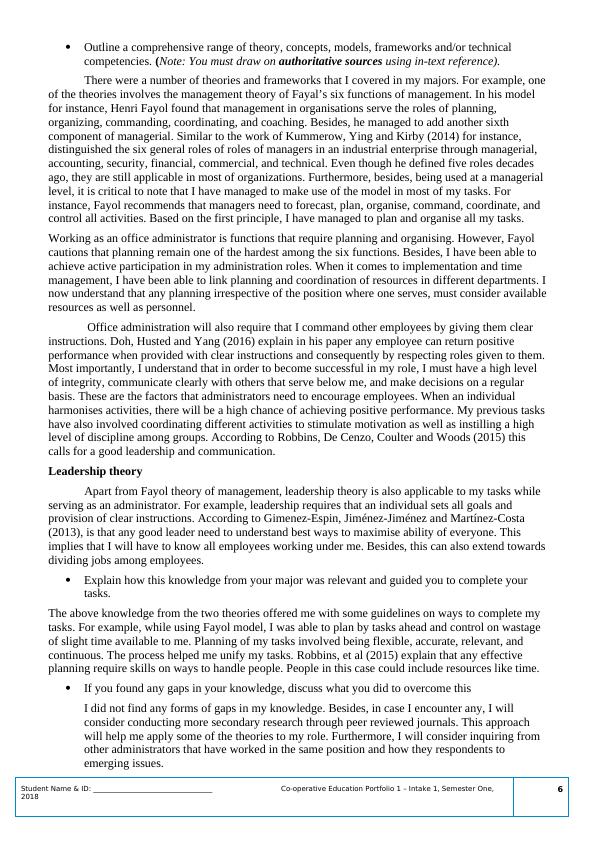
End of preview
Want to access all the pages? Upload your documents or become a member.
Related Documents
BUSS701: Bachelor of Businesslg...
|17
|10050
|41
Manage Personal Stressors in the Work Environmentlg...
|21
|4835
|88
English for Academic Purposes 1 (EAP 1) PDFlg...
|12
|3778
|478
Assessment of Learning Outcomeslg...
|14
|3521
|383
Early Childhood Education and Care Skills Workbook 7 CHC30113 Certificate III in Early Childhood Education and Care Skillslg...
|75
|12836
|203
EAPA3004 English for Academic Purposes : Assignmentlg...
|11
|4220
|234
